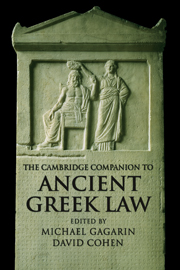Book contents
- Frontmatter
- Introduction
- Part 1: Law in Greece
- Part 2: Law in Athens I: Procedure
- Part 3: Law in Athens II: Substantive Law
- 11 Crime, Punishment, and the Rule of Law in Classical Athens
- 12 Gender, Sexuality, and Law
- 13 Family and Property Law
- 14 Athenian Citizenship Law
- 15 Commercial Law
- Part 4: Law outside Athens
- Part 5: Other Approaches to Greek Law
- Index
12 - Gender, Sexuality, and Law
from Part 3: - Law in Athens II: Substantive Law
Published online by Cambridge University Press: 28 August 2006
- Frontmatter
- Introduction
- Part 1: Law in Greece
- Part 2: Law in Athens I: Procedure
- Part 3: Law in Athens II: Substantive Law
- 11 Crime, Punishment, and the Rule of Law in Classical Athens
- 12 Gender, Sexuality, and Law
- 13 Family and Property Law
- 14 Athenian Citizenship Law
- 15 Commercial Law
- Part 4: Law outside Athens
- Part 5: Other Approaches to Greek Law
- Index
Summary
Until the 1970s, more or less, the history of women and sexuality did not interest the academic community. When it was even considered, such history was limited to a few references within research dedicated to more traditional subjects, regarded as scientifically more interesting. In the past thirty years, however, the horizons of classicists have expanded to include these issues and to dedicate ever more attention to the problem of social construction of gender as a political organizing principle.
The opening up of these new horizons is part of a more general transformation of ancient and modern historiography, tied to the French school that followed Fernand Braudel, who criticized the history that concentrated on the great events and major figures (“l'histoire evenementielle,” as Francois Simiand defined it), neglecting the underlying social reality and ignoring the existence of millions and millions of anonymous individuals. In this light new historiographic subjects were born, the different and marginal from every epoch: the sick, the old and young, homosexuals, women - subjects, all of them, whose history is not determined by events, but rather by mental attitudes, ideologies, practicalities of everyday life and their position in a socioeconomic context. The history of women and sexuality and the reconstruction of gender problems have thus established themselves inside this new history, no longer only “evenementielle.”
- Type
- Chapter
- Information
- The Cambridge Companion to Ancient Greek Law , pp. 236 - 253Publisher: Cambridge University PressPrint publication year: 2005
- 11
- Cited by



